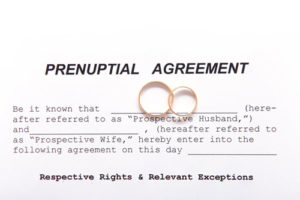Should You Have a Prenup?
Prenuptial agreements are a smart way to protect your assets.
You have probably heard that Kim Kardashian and Kanye West recently got engaged. The newly-engaged couple has reportedly agreed to sign a prenuptial agreement, or “prenup”, before they tie the knot. Most legal experts would agree that the couple should not walk down the aisle until finalizing a prenup.
Prenuptial agreements are contracts drafted and executed prior to marriage that govern all financial aspects in the event of divorce. However, prenups are not just for the super wealthy or for celebrities. The Huffington Post reports that prenuptial agreements are on the rise. According to a survey administered by the American Academy of Matrimonial Lawyers, 63 percent of divorce attorneys have noticed an increase in prenups over the past three years, and 46 percent of those attorneys surveyed noted an increase in the number of women initiating requests for prenups.
So that begs the question: Should you have a prenup? Many couples seeking to get married find prenups “unromantic” and, candidly, they are. However, while prenup discussions can be awkward, engaged couples should consider that marriage is akin to a business relationship that requires protection for both individuals. Whether you need a prenup is specific to your situation.
Pennsylvania law relies on traditional contract law principles in addressing the validity and enforceability of prenuptial agreements. Simeone v. Simeone, 581 A.2d 162 (Pa. 1990). Often times, valid and enforceable prenuptial agreements involve full disclosure of financial resources simultaneous with the voluntary execution of the agreement. Spouses may challenge the validity and/or enforceability of the prenuptial agreement pursuant to 23 Pa.C.S.A. § 3106. Section 3106 provides that an agreement shall not be enforceable if the spouse challenging the agreement proves, by clear and convincing evidence, that:
- the spouse did not voluntarily execute the agreement; or
- before signing the agreement:
(i) the spouse was not provided a fair and reasonable disclosure of the other spouse’s property or financial obligations,
(ii) the spouse did not voluntarily and expressly waive, in writing, any right to the disclosure of the other spouse’s property or financial obligations beyond the disclosure provided, and
(iii) the spouse did not have an adequate knowledge of the property or financial obligations of the other spouse.
In short, couples have a lot to think about before deciding whether a prenuptial agreement is necessary to their particular situation. Parties should agree to consult separate family law attorneys and make full and fair disclosures of their financial positions. We recommend taking these steps early in engagement, to provide the parties and attorneys ample time to review the information and to draft and execute the prenuptial agreement so the couple can truly enjoy their wedding.
To speak with an experienced family law attorney at JSDC Law Offices to determine whether a prenuptial agreement is right for you, please contact us by calling 717-883-5671.


